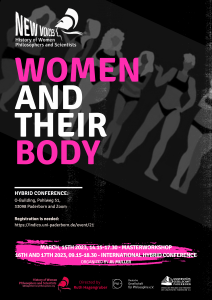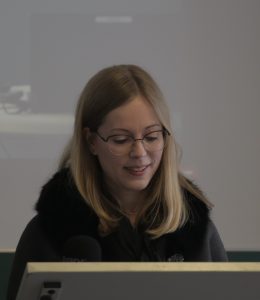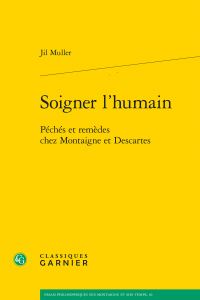This very complex problem of the female body not only stems from a long history of the body itself but goes hand in hand with an equally complex problem of women, their status in society and as the opposite sex to men. The question of the female body is linked to the fact that it was men who defined women, who created a concept, or a definition of what women should be.
 In organising the 2023 Women and Their Bodies conference, my main concern was to explore the female body from many different perspectives, always with the ulterior motive of anchoring these perspectives historically and philosophically, and thus giving the female body a higher status in our society.
In organising the 2023 Women and Their Bodies conference, my main concern was to explore the female body from many different perspectives, always with the ulterior motive of anchoring these perspectives historically and philosophically, and thus giving the female body a higher status in our society.
The idea for this conference is the result of my own historical-philosophical research, anchored in the philosophical-medical tradition of the 16th and 17th centuries, when doctors began to focus their attention on the female body. The aim was to find out whether our society views the female body so differently from then, or whether little has changed.
Unfortunately “for much of the history of western philosophy the body has been conceptualized as simply one biological object among others, part of a biological nature, which our rational faculties set us apart from, as well as an instrument to be directed, and a possible source of disruption to be controlled” (Lennon 2019). Talking about the female body, or even about the body in general, implies different styles of discourse, linked on the one hand to the different levels of perception, which can be internal or external, sensitive or mental, through which we experience our bodies, and on the other hand to the perspectives that one wishes to emphasise when talking about the body, such as the feminist perspective. Hierarchical differences between men and women are most often found in the second case, when a particular perspective is emphasised. The body thus seems to be a core element of patriarchal thinking that is not so easy to overcome. According to this world view, a woman’s body cannot belong to her alone.
In my own research, the body has always been at the centre: understanding how the body functions enables me to place it in a new philosophical and political context.
Therefore, I have for example, focused on Cartesian dualism (the mind-body problem) and its mechanism: “Ambroise Paré and René Descartes on sensation in amputated limbs,” in F. Baldassari (ed.), Descartes and Medicine, Problems, Responses and Survival of Cartesian Discipline, Brepols Publisher, 2023, p. 81-97; and “Descartes on clocks and automata,” accepted for publication in a Palgrave special issue (2024).
I have also analysed the theories of humours, in connection with their moral theories, in Montaigne and Descartes: “Les ‘fleaux de nostre ame’ : les vices dans la pensée de Montaigne et de Descartes,” BSIAM, Classiques Garnier, n° 73, 2021; and “Eritis sicut dii, scientes bonum et malum: Sin, Pride, and Curiosity in the Moral Philosophy of Montaigne and Descartes”, in Philosophie et scepticisme de Montaigne à Hume, Mélanges en l’honneur de Gianni Paganini, Éditions Honoré Champion, 2023, p. 65-80.
And I studied the theories of humours with a focus on melancholy, in Montaigne and Felix Platter: “L’anatomie de la mélancolie chez Michel de Montaigne et Félix Platter,” Montaigne Studies, Vol. XXXII, March 2020, p. 99-118;
 as well as in Descartes and Elizabeth of Bohemia: “Humours, Passions, and Consciousness in Descartes’s Physiology: The Reconsideration through the Correspondence with Elisabeth,” in Andrea Strazzoni and Marco Sgarbi (eds.), Reading Descartes, Consciousness, Body, and Reasoning, Firenze University Press, 2023, 59-80 DOI: 10.36253/979-12-215-0169-8.05
as well as in Descartes and Elizabeth of Bohemia: “Humours, Passions, and Consciousness in Descartes’s Physiology: The Reconsideration through the Correspondence with Elisabeth,” in Andrea Strazzoni and Marco Sgarbi (eds.), Reading Descartes, Consciousness, Body, and Reasoning, Firenze University Press, 2023, 59-80 DOI: 10.36253/979-12-215-0169-8.05
and in my doctor thesis: “Soigner le corps et l’esprit – Descartes et Élisabeth Souffrance corporelle et mélancolie,” in Soigner l’humain Péchés et remèdes chez Montaigne et Descartes, Classiques Garnier, 2022, p. 387-424.
In my current research I am trying to combine the moral and medical theories of women and men philosophers in order to get a more complete picture of man and the ‘world view’ of the 16th and 17th centuries. The mind-body problem; matter and mechanism; humours; happiness and good behaviour are some of the key concepts of my current work.
You cannot copy content of this page








